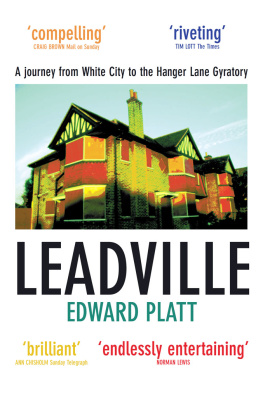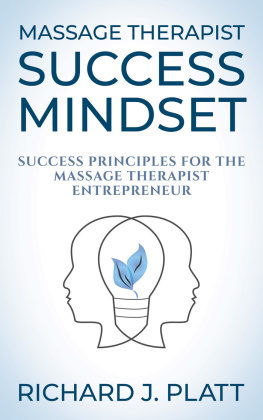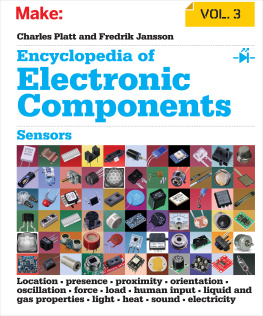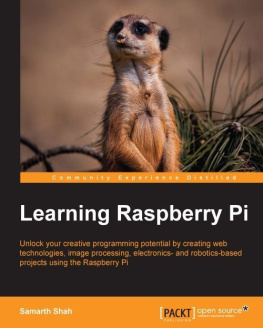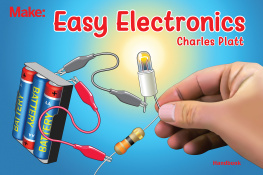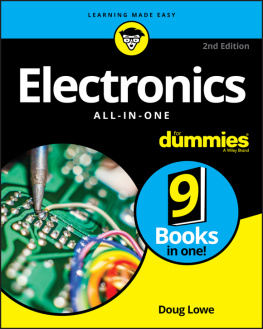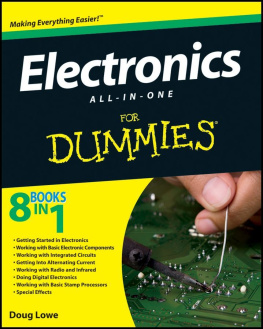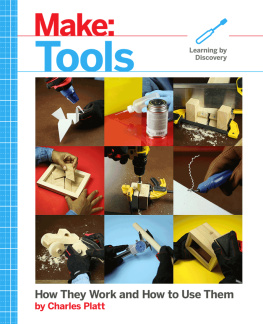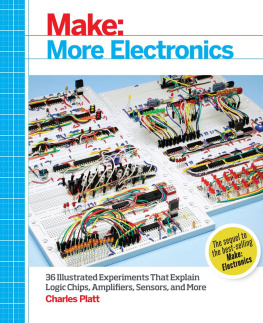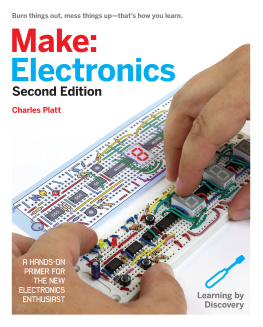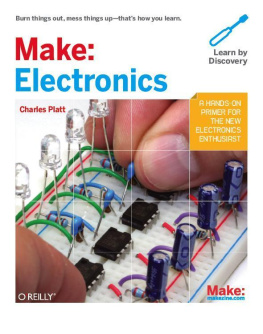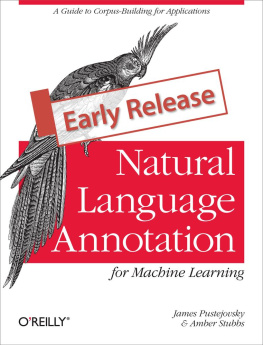Platt - Make Electronics Learning Through Discov
Here you can read online Platt - Make Electronics Learning Through Discov full text of the book (entire story) in english for free. Download pdf and epub, get meaning, cover and reviews about this ebook. year: 2011;2009, publisher: OReilly Media, Inc., genre: Home and family. Description of the work, (preface) as well as reviews are available. Best literature library LitArk.com created for fans of good reading and offers a wide selection of genres:
Romance novel
Science fiction
Adventure
Detective
Science
History
Home and family
Prose
Art
Politics
Computer
Non-fiction
Religion
Business
Children
Humor
Choose a favorite category and find really read worthwhile books. Enjoy immersion in the world of imagination, feel the emotions of the characters or learn something new for yourself, make an fascinating discovery.

- Book:Make Electronics Learning Through Discov
- Author:
- Publisher:OReilly Media, Inc.
- Genre:
- Year:2011;2009
- Rating:5 / 5
- Favourites:Add to favourites
- Your mark:
- 100
- 1
- 2
- 3
- 4
- 5
Make Electronics Learning Through Discov: summary, description and annotation
We offer to read an annotation, description, summary or preface (depends on what the author of the book "Make Electronics Learning Through Discov" wrote himself). If you haven't found the necessary information about the book — write in the comments, we will try to find it.
Make Electronics Learning Through Discov — read online for free the complete book (whole text) full work
Below is the text of the book, divided by pages. System saving the place of the last page read, allows you to conveniently read the book "Make Electronics Learning Through Discov" online for free, without having to search again every time where you left off. Put a bookmark, and you can go to the page where you finished reading at any time.
Font size:
Interval:
Bookmark:
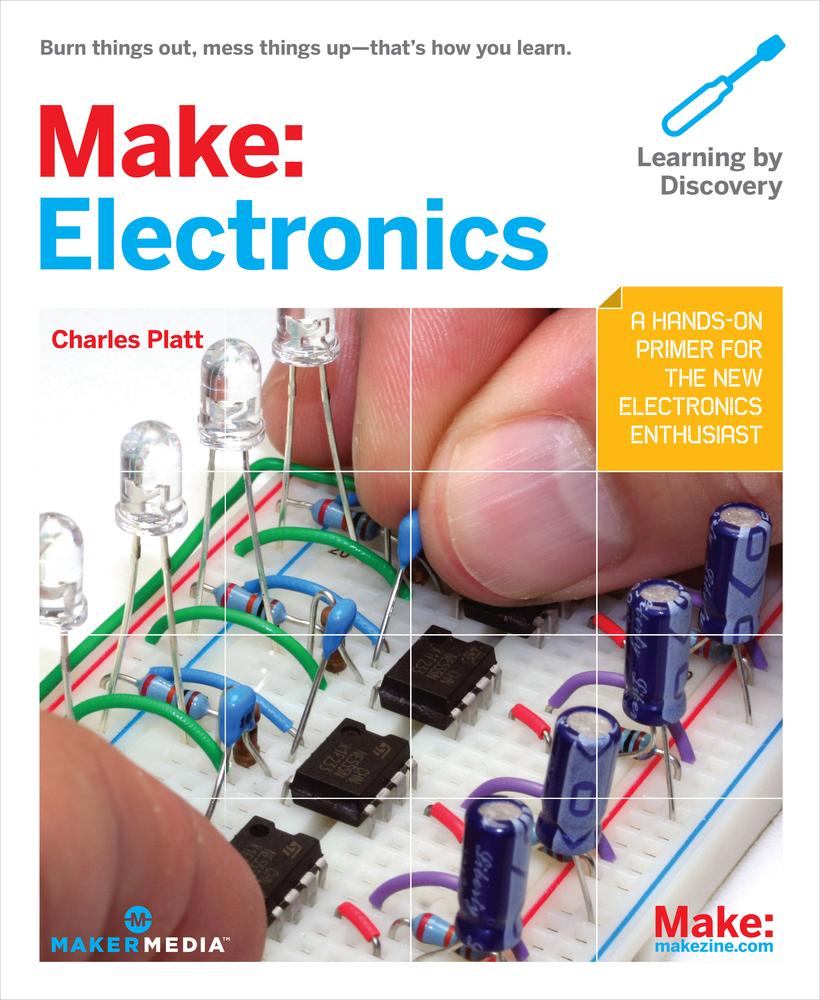
Make: Electronics
Learning by Discovery
Charles Platt
with photographs and illustrations by the author

Make: Electronics
by Charles Platt
Copyright Helpful Corporation. All rights reserved.
Printed in Canada.
Published by Maker Media, Inc., 1005Gravenstein Highway North, Sebastopol, CA 95472.
Maker Media books may be purchased foreducational, business, or sales promotional use. Online editions are alsoavailable for most titles ( my.safaribooksonline.com ). For moreinformation, contact our corporate/institutional sales department:800-998-9938 or corporate@oreilly.com .
Editors: Dale Dougherty and Brian Jepson
Development Editor: Gareth Branwyn
Production Editor: Rachel Monaghan
Technical Editor: Andrew Bunnie Huang
Copyeditor: Nancy Kotary
Proofreader: Nancy Reinhardt
Indexer: Julie Hawks
Cover Designer: Mark Paglietti
Interior Designer: Ron Bilodeau
Illustrator/Photographer: Charles Platt
Cover Photographer: Marc de Vinck
Print History:
December 2009: First Edition.
The Make logo and Maker Media logoare registered trademarks of Maker Media, Inc. Many of the designations usedby manufacturers and sellers to distinguish their products are claimed astrademarks. Where those designations appear in this book, and Maker Media,Inc., was aware of a trademark claim, the designations have been printed incaps or initial caps.
While every precaution has been taken in the preparation of this book, the publisher and author assume no responsibility for errors or omissions, or for damages resulting from the use of the information contained herein.
ISBN: 978-0-596-15374-8
[TI]
For my dearest Erico
Preface
How to Have Fun with This Book
Everyone uses electronic devices, but most of us dont really know what goes on inside them.
Of course, you may feel that you dont need to know. If you can drive a car without understanding the workings of an internal combustion engine, presumably you can use an iPod without knowing anything about integrated circuits. However, understanding some basics about electricity and electronics can be worthwhile for three reasons:
- By learning how technology works, you become better able to control your world instead of being controlled by it. When you run into problems, you can solve them instead of feeling frustrated by them.
- Learning about electronics can be funso long as you approach the process in the right way. The tools are relatively cheap, you can do all the work on a tabletop, and it doesnt consume a lot of time (unless you want it to).
- Knowledge of electronics can enhance your value as an employee or perhaps even lead to a whole new career.
Learning by Discovery
Most introductory guides begin with definitions and facts, and gradually get to the point where you can follow instructions to build a simple circuit.
This book works the other way around. I want you to start putting components together right away. After you see what happens, youll figure out whats going on. I believe this process of learning by discovery creates a more powerful and lasting experience.
Learning by discovery occurs in serious research, when scientists notice an unusual phenomenon that cannot be explained by current theory, and they start to investigate it in an effort to explain it. This may ultimately lead to a better understanding of the world.
Were going to be doing the same thing, although obviously on a much less ambitious level.
Along the way, you will make some mistakes. This is good. Mistakes are the best of all learning processes. I want you to burn things out and mess things up, because this is how you learn the limits of components and materials. Since well be using low voltages, therell be no chance of electrocution, and so long as you limit the flow of current in the ways Ill describe, there will be no risk of burning your fingers or starting fires.
 Stay Within the Limits!
Stay Within the Limits!
Although I believe that everything suggested in this book is safe, Im assuming that you will stay within the limits that I suggest. Please always follow the instructions and pay attention to the warnings, denoted by the icon you see here. If you go beyond the limits, you will expose yourself to unnecessary risks.
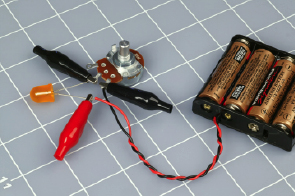
Figure P-1. Learning by discovery allows you to start building simple circuits right away, using a handful of cheap components, a few batteries, and some alligator clips.
How Hard Will It Be?
I assume that youre beginning with no prior knowledge of electronics. So, the first few experiments will be ultra-simple, and you wont even use solder or prototyping boards to build a circuit. Youll be holding wires together with alligator clips.
Very quickly, though, youll be experimenting with transistors, and by the end of Chapter 2, you will have a working circuit that has useful applications.
I dont believe that hobby electronics has to be difficult to understand. Of course, if you want to study electronics more formally and do your own circuit design, this can be challenging. But in this book, the tools and supplies will be inexpensive, the objectives will be clearly defined, and the only math youll need will be addition, subtraction, multiplication, division, and the ability to move decimal points from one position to another.
Moving Through This Book
Basically there are two ways to present information in a book of this kind: in tutorials and in reference sections. Im going to use both of these methods. Youll find the tutorials in sections headed as follows:
- Shopping Lists
- Using Tools
- Experiments
Youll find reference sections under the following headings:
- Fundamentals
- Theory
- Background
How you use the sections is up to you. You can skip many of the reference sections and come back to them later. But if you skip many of the tutorials, this book wont be of much use to you. Learning by discovery means that you absolutely, positively have to do some hands-on work, and this in turn means that you have to buy some basic components and play with them. You will gain very little by merely imagining that you are doing this.
Its easy and inexpensive to buy what you need. In almost any urban or suburban area in the United States, chances are you live near a store that sells electronic components and some basic tools to work with them. I am referring, of course, to RadioShack franchises. Some Shacks have more components than others. Many may carry the Maker Shed kits that were developed to go with this book.
You can also visit auto supply stores such as AutoZone and Pep Boys for basics such as hookup wire, fuses, and switches, while stores such as Ace Hardware, Home Depot, and Lowes will sell you tools.
If you prefer to buy via mail order, you can easily find everything you need by searching online. In each section of the book, Ill include the URLs of the most popular supply sources, and youll find a complete list of URLs in the appendix.
Fundamentals
Mail-ordering components and tools
Here are the primary mail-order sources that I use myself online. I leave it to you to shop around for bargains, if you are so inclined.
Font size:
Interval:
Bookmark:
Similar books «Make Electronics Learning Through Discov»
Look at similar books to Make Electronics Learning Through Discov. We have selected literature similar in name and meaning in the hope of providing readers with more options to find new, interesting, not yet read works.
Discussion, reviews of the book Make Electronics Learning Through Discov and just readers' own opinions. Leave your comments, write what you think about the work, its meaning or the main characters. Specify what exactly you liked and what you didn't like, and why you think so.

